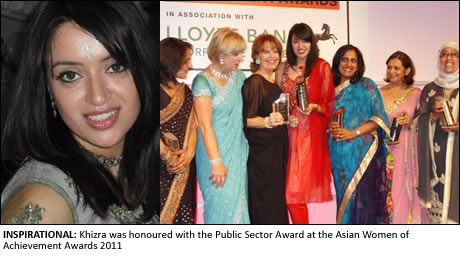Detective Inspector Khizra Dhindsa talks to Jennideep Kaur Hayre

DETECTIVE Inspector Khizra Dhindsa dreamt of being a police officer her whole life until one day her dreams became reality. She told Jennideep Kaur Hayre about how she defied the role of the traditional Asian woman and overcame cultural barriers to become the active Asian role model in policing she is today.
Khizra remembers an important message her parents told her when growing up: “there’s nothing a man can do that you can’t” which she still firmly believes and helped her successfully become a policewoman.
Khizra was born in Birmingham and grew up in Perry Barr. Her parents were Muslims and she was taught that religion should be something that liberates people and encourages them to maximise their potential in life. Instead she believes it is often used to contain people rather than opening people’s thinking and way of life, which upsets her.
With Khizra and her older sister being the only two daughters in the family her Dad would frequently say: “You’re not my daughters you’re my ‘shere-puthars’ (lion children) and I’m not going to have anyone say I’ve only got two daughters, because my daughters are my sons.”
Khizra’s father was a poet particularly well-known in Pakistan and her mother, her greatest role model, was a homemaker and teacher. Her mother was often challenged by people about allowing her husband to provide for her and not needing to work.
However she’d reply: “Why should I have to put my hand out for money from my husband? I’m not a child I’m a fully grown woman and I want a bit of pride and independence.”
Khizra’s parents had a “love marriage” considering her Dad was a Shi’ite and Mum a Sunni. Coming from two different sets of Islam who didn’t usually marry each other Khizra respects the fact they overcame that barrier, especially her Mum being an Asian woman of that era.
Perry Barr was a predominantly Asian area. At the local primary school Khizra went to 99% of the children were Asian Muslims of Pakistani origin and surprisingly the ethnic minority were white children.
This changed when Khizra passed her 11+ and went to a grammar school. She went from previously being part of the ethnic majority to becoming the ethnic minority.
“The juxtaposition in being an ethnic minority and majority taught me early on that people aren’t a whole lot different. We should look for the similarities between us and not the differences and that’s where my core values come from now.”
Khizra was 16 when she was taken to Pakistan for an arranged marriage but she stood up to her family and said no.
Both her parents had died by this age so other family members took her under their wing until they left her with no alternative aged 18. She either had to agree to the arranged marriage or go it alone.
That was the day Khizra made the most important decision of her life.
So with little money in her back pocket and a bag of clothes over her shoulder Khizra left to make a new life for herself in Coventry.
She went on to study Law at Coventry University but was treated like a foreign student, having just come back from Pakistan, which meant paying her own tuition fees.
She balanced full-time studying with a part-time job but Khizra admits times weren’t always easy.
“There was a period when I had nowhere to live, I was effectively penniless and had the choice between food and books. I chose books to study and went to bed hungry. Everyone goes through challenges but it’s how you respond to those challenges that makes you who you are.”
After graduating she became a ground-level PC during a time when there were few other Asian women in the police force. Khizra hopes her progress will help inspire other Asian women to join the forces.
She became a constable with the West Midlands Police in 2001 and was promoted to sergeant four years later.
In 2008 Khizra took charge of a rough and challenging neighbourhood in Birmingham called Shard End. Remarkably she managed to reduce crime there by 43%.
Khizra admits she’s been in many life or death situations. She has dozens of scars from such incidents but said: “I wear these scars like medals because I’m proud, whenever I look at them I think of a life saved.”
Whether it be saving someone from jumping off the top of a building or one incident where a man had doused himself in petrol and was ready to set himself alight, Khizra has always been at the forefront when dealing with dangerous situations.
Such brave and commendable acts have resulted in Khizra becoming British Policewoman of 2011 and winning the Public Sector Award at the 2011 Asian Women of Achievement of Awards.
“I was gobsmacked because when hard work is your passion doing it has its own rewards. The people I have helped are my trophies.”
More recently Khizra won the award for community leadership at the Mosaic Talent Awards.
Khizra currently serves as the National Women’s Engagement Officer for the National Prevent Delivery Unit under the Association of Chief Police Officers.
Her national women’s initiative, Project Shanaz, was founded in April 2011.
Named after Khizra’s mother, Project Shanaz is about engaging women in counter-terrorism activity. It is a national body of 50 women representing the communities of every police force in England and Wales who are involved in setting and delivering policies and strategies to prevent extremism and terrorism.
For example, they educate people in Islam so they’re unlikely to become a terrorist or support terrorist activity. They also help safeguard those who might be vulnerable to recruitment by radicalisers.
This follows a case in 2010, when a grade-A Muslim student from King’s College stabbed her local MP after listening to online videos by a radical Islamic preacher. She is currently serving a life sentence but Khizra hopes with the work of Project Shanaz other women will be deterred from following the same path.
Khizra admits that if she’d never faced cultural barriers then she would not be the free thinking and open-minded individual with the ability to challenge that she is now.
Yet, the one thing that frustrates Khizra about her culture is how the expectation of Asian women is set so low.
“I always say to the women I mentor: set the bar ridiculously high, aim for what other people say is impossible and dream those dreams that nobody else dares. Even if you fall short it’s a hell of a lot more than people expected from you so do not live down to people’s expectations of you.”
Happily-married, Khizra jokes how she wed the man of her choice at 28 which in Asian women terms is about 103, as Asian women are expected to marry quite young.
In July, Khizra will be taking part in The SunWalk in London to raise money for breast cancer charities after her Mum died from breast cancer when she was 13.
“I don’t want children to go through what I went through, it was the most difficult part of my life even now when I look back.”
Reflecting on her life so far Khizra has no regrets and says she feels confident because life has thrown its worse at her before and she has handled it.
“I could have been surrounded by barriers for the past 32 years of my life but the fact I’ve never recognised them has got me to where I am today. You can confront me with barriers and I will find a way over, under or around them but I will not accept them.”
“Asian women need these barriers to be dismantled then we can take our place quite powerfully in the world.”
The biggest piece of advice she’d give to young Asian women is that there is no limit. She even believes the country is ready for an Asian woman prime minister.
“The only thing holding you back is yourself. If people doubt or stereotype you prove them wrong. Listen to those who support you, if the detractors are going to teach you something learnt from it and move on don’t let criticism fester inside you for too long.”
As for the future, Khizra would like to reach the highest position within the West Midlands Police, the police force she loves.




































